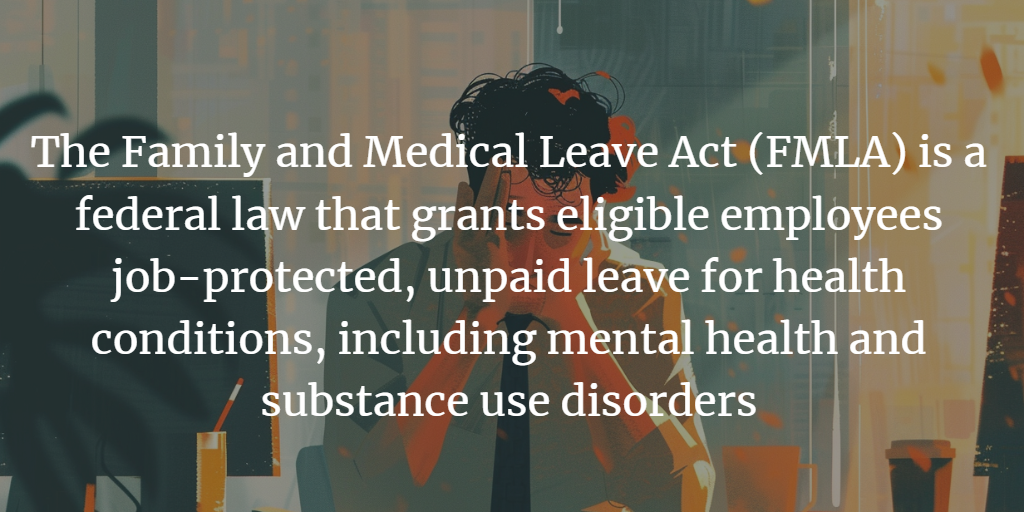My Loved One Needs Addiction Help — But They Can’t Lose Their Job
Can you go to rehab, but actually keep your job? This is one of the most common concerns we hear at Redemption Recovery, and we understand it completely. Many times, people caught in the throes of addiction know they need help, and they may even be willing to get it — but the one thing holding them back is the fear of economic insecurity.
When it comes to seeking help for addiction or mental health, a major hurdle for many is the fear of jeopardizing their job. Unfortunately, some folks still don’t view substance abuse and mental health conditions on par with other significant medical issues.
However, the medical community and the law recognize them as equally important. If you or someone you love needs help with an addiction to drugs or alcohol, some protections could help them get treatment and still hold onto their job.
How the FMLA Can Help Someone Go to Rehab Without Losing Their Job
Many people are aware that it’s possible to go to a drug and alcohol treatment center in Ohio and return to your job after treatment. The catch is that most people don’t know the details — but don’t worry, we will tell you everything you need to know in this article.
First, let’s talk about the FMLA law and how it works.

The Family and Medical Leave Act (FMLA) is a federal law that grants eligible employees job-protected, unpaid leave for health conditions, including mental health and substance use disorders. Employers covered by the FMLA must maintain group health benefits during this leave. The FMLA allows up to 12 weeks of unpaid annual leave for specific family and medical reasons. It applies to public agencies, schools, and companies with 50+ employees.
You may still have questions about the FMLA and how to use it. Below is a frequently asked questions section about the FMLA and treatment.
Answers about FMLA and Drug and Alcohol Treatment
How do you know if your job is FMLA-eligible?
Your job is subject to the FMLA law as long as you meet all these conditions:
- You work for a covered employer for at least 12 months
- You’ve been a full-time employee there for the past year (1,250 work hours)
- Your company has at least 50 employees within 75 miles.
- You work for a local, state, or government agency.
What types of jobs aren’t FMLA-eligible?
If you are self-employed or work for a small business with less than 50 employees, you will not have FMLA protection. Also, if you haven’t been at your job for a year or you aren’t full-time. But if any of those things are true — don’t lose hope!
We have seen many people come to treatment at Redemption Recovery without FMLA protection and still return to work. The key is being honest and open with your employer.
If you have a good relationship with your boss, just tell them the truth and ask them if they will work with you. You might be surprised what people are willing to do when you appeal to their better nature. Feel free to call us for advice first before you have that conversation.
Are you sure FMLA protects my job for addiction treatment?
Yes, 100% sure. As long as your job is subject to the FMLA, you can take FMLA leave for any serious health condition — that includes substance abuse or mental health. The only other condition requires residential treatment or ongoing care and treatment.
How does FMLA protect my job?
As long as you file the paperwork and go through the process the way we explain below and you are FMLA-eligible and leave is granted, then you will get the following benefits:
- Your employer cannot fire you for seeking treatment.
- FMLA allows you to attend drug treatment without risking your job.
- When you return to work, they must either give you your old job back or a job as close to it as possible in terms of pay, benefits, work, etc.
What else should I know about taking FMLA to go to rehab in Ohio?
FMLA leave is unpaid leave by default, but you will be able to use any PTO or sick time you have and collect a paycheck for those hours while you’re in rehab.
The FMLA allows you up to 12 weeks (i.e. 60 working days or 2 months) of time off — as long as you are receiving treatment during that time.
It is important to follow the rules and do it the right way if you expect to get protection under this law. It only works when the proper forms are completed and the procedure is done right. But it’s not that complicated, so don’t worry. We’re about to explain exactly how to do it.
How Do You Apply for FMLA to go to Treatment?
Here are the steps you will want to follow to use FMLA to go into addiction treatment in Ohio:
- Tell Your Employer: Let your company know that you need to go to substance use disorder treatment. Don’t be afraid or ashamed—this is a legitimate medical problem, and you’re entitled to help.
- Wait for Their Response: Within five business days, your employer will confirm if you’re eligible for FMLA leave. If not, your leave isn’t FMLA-protected. But you can request leave again later if your eligibility changes (e.g., after a year of full-time work).
- Medical Certification Form: Take an FMLA Medical Certification Form to your health care provider. This form confirms that you are in need of drug and alcohol treatment. Return it within 15 days.
- Wait for Employer to Review: Your employer will notify you within five business days if your leave is designated as FMLA. If it is, congrats—it’s FMLA-protected!
- Go Back to Work: After you finish your substance abuse treatment and get a clean bill of health, your employer must give you the same or a similar job with equal pay and benefits. When you’re under FMLA protection, they cannot demote you or fire you for going to treatment.
Dual-Diagnosis Treatment in Ohio at Redemption Recovery
You or the person you love deserves the best possible shot at recovery. That’s what Redemption Recovery is all about. We’re ready to help you take the first step into a new life of health, happiness, and freedom from addiction.
Our compassionate team of mental health professionals is here to help — but you must make the first move.
One phone call can change the future.
It’s time for Redemption: (419) 528-8007





